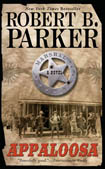 I have just spent 2 hours in the presence of some good friends, and am covered in the glow of a good time (even if TLomL will bemoan the fact that I knocked off a hardcover in a single 2-hr setting, sorry dear).
I have just spent 2 hours in the presence of some good friends, and am covered in the glow of a good time (even if TLomL will bemoan the fact that I knocked off a hardcover in a single 2-hr setting, sorry dear).
I was apprehensive and ambivalent about picking up one of the last books that Parker finished before his death, but that vanished by the end of a chapter or two–and given the wafer-thin nature of his chapters, that means it didn’t take long at all. And other than the occasional transient thought, it really didn’t come up as I read. But now I’m done, and all I can think about his how this was the end of the road. And that’s really too bad.
Many people will say they can tell in Rex Stout’s final novel that Stout pretty much wrote a conclusion to his series–not an airtight conclusion, he could’ve easily continued, but it served well as a conclusion to his long-running series. The same could be said for Split Image, although Night and Day could’ve functioned that way as well (but not as neatly, and the book wasn’t nearly as good, so I’m glad it didn’t have to). There is a real sense of Parker saying goodbye to the characters — although a lot of that is likely projection and isogesis on my part.
For awhile there, as the quality of Parker’s other series/works vacillated, the Jesse Stone novels could be counted on for a certain level of quality–but lately, they’ve been just up and down as the rest. Thankfully, thankfully, Split Image comes out on the up side. Sure, there’s the now typical wandering around in the middle portion, but there’s enough various plot elements at play that it doesn’t detract as much.
A typical Parker novel will have 2 plotlines, one having to do with a case and another having to do with some personal conflict with the protagonist–and with Jesse Stone novels, that’s typically Jesse dealing with his ex-wife and excessive drinking. But a few years back, Parker merged his female PI series into the Stone books, and this is the pinnacle of that merge giving us 4 basic plots–the crime Jesse’s dealing with, the case Sunny’s working, Jesse dealing with Jen and alcohol, and Sunny dealing with her relationship with her ex. That’s enough balls in the air at one time that even if the novel’s basically at a standstill, you don’t notice.
And thankfully, each plotline actually works pretty well. Jesse’s investigating a double murder involving some gangsters, Sunny’s dealing with a girl who may have been kidnapped/brainwashed by a possible cult (shades of an old Spenser case as is typical of a Sunny story), Jesse’s gaining insight (with the help of Sunny/his therapist) into what he expects from a relationship with a woman and how Jen just wouldn’t fit that, and Sunny’s gaining insight (with the help of Jesse/her shrink) into her relationship needs with men.
Throw in appearances from Spenser regulars, enough name-dropping to tie Jesse’s gangsters into the larger Parker-verse, the lines any Parker novel has to have (‘We’d be fools not to,’ ‘Enough with the love talk,’ etc.), the glorification of having pet dogs (yet another Parker philosophy that’s dead-on), and an actual satisfying conclusion to the investigations and you have yourself a great Parker novel.
Not the book to start reading Stone with (that’s Night Passage), but for people who know the characters it’s a darn satisfying read.
I should admit I was pretty embarrassed at how long it took me to get the title. In my defense, tho’ I really didn’t think about it until I saw it out of the corner of my eye printed on top of p. 195 and had an “Well Duhhhh” moment.


 Robert B. Parker, author of almost 70 books, died yesterday morning. When I read the news this morning, I was stunned. I knew he was getting up in years, but I just couldn’t wrap my head around the idea. A few moments later I was hit by a powerful sense of loss — it was like I’d lost a friend.
Robert B. Parker, author of almost 70 books, died yesterday morning. When I read the news this morning, I was stunned. I knew he was getting up in years, but I just couldn’t wrap my head around the idea. A few moments later I was hit by a powerful sense of loss — it was like I’d lost a friend. It got me to Midway, and even gave me a few minutes of pre-sleep reading while at GA.
It got me to Midway, and even gave me a few minutes of pre-sleep reading while at GA.